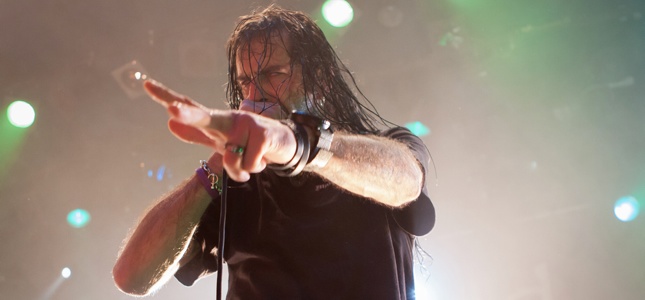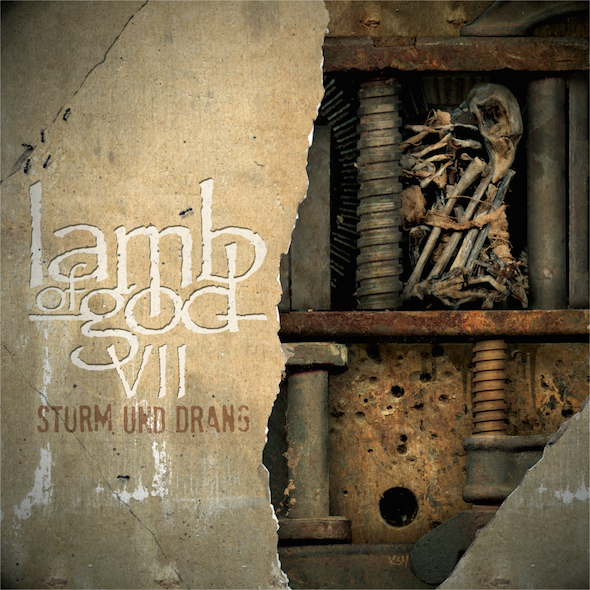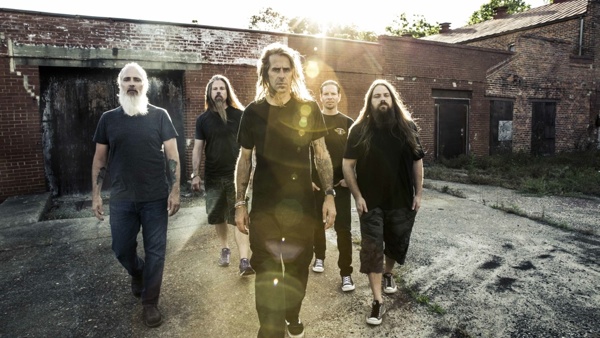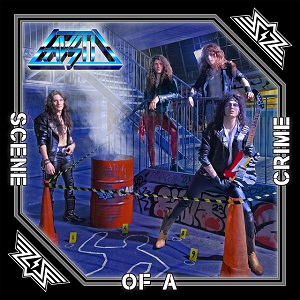LAMB OF GOD – “The Last Thing On My Mind Is My Fucking Heavy Metal Band, When I’m Looking At Five To Ten Years”
July 24, 2015, 9 years ago

US A-grade metal saviours Lamb of God have had a hard time of it as late, but then you knew that, given the documentary on Randy’s trial, a traumatic event which we will also be able to re-reflect upon in detail once his extensive autobiography hits shelves. We don’t need to re-live it here again, but in brief, Randy was tossed in jail awaiting trial, in Czech Republic, based on a fan dying after he was pushed off the stage at a Lamb of God gig friggin’ two years earlier. On March 5, 2013, he was found not criminally liable, but as he’s said all along, there’s nothing to rejoice here, as one of his fans is still dead, at a young 19 years of age as well.
Crawling from the wreckage, Lamb of God have given us now their first album in over three years. VII: Sturm Und Drang is everything you expect from the band like they’ve never been gone, along with a spot of singing that seems to have the bravewords.com scribes raising their scribe eyebrows (see Crossfire).
But the free and clear Randall Blythe casts an eye toward his two guitarists to spot the contrast between this album and the previous six...
“Yes, well, I would say that this record—and not just against Resolution, but the one or two before it—is a much more cohesive Lamb of God record. You kind of get the whole Lamb of God experience, the whole package this time, and that is entirely due to the fact that the guys who write the music, that being Mark and Willy, did it together in the studio rather than at home, you know? The other records, to me, they sound like Lamb of God, but they’re a collection of different people’s songs. There’s very little like in-depth, ‘we wrote this song together,’ I think, on those albums. On this one, they were hijacking each other’s riff, they were changing this and that... It got to the point where I would come in... because I can always tell a Mark song or a Willy song.”

And that difference would be...?
“What is the difference between a Mark and a Willy song? You know, Mark... well, Willy started getting weird (laughs). But Mark definitely comes from a more classic rock background; he really does. Where you hear like blues licks in the solos and stuff—that’s Mark, for the most part. Willy, I think is a more technical kind of dude than Mark. Now, me saying this, I would like to qualify this right now and please put this in the interview, I’m not a guitar player, and I might not know what I’m talking about (laughs). Okay? But I would say Mark is more like the soul, and Willy is more like the heart. However on this record, man, it really changed, because they hijacked each other’s riffs and wrote... For example, a song like ‘Overlord,’ upon hearing it first, the verse stuff, I would immediately say that’s a Mark song. But it’s not! It’s a Willy song. So it’s kind of a throwback to the way we used to do things way back, the way all bands used to do things, when bands were real bands. They got in a practice space together and wrote together like a band does, instead of at home on their computer. So this, to me, I knew it was working when I would come to the studio and Josh (Wilbur – producer) would play me a song, and he goes, ‘Who do you think this is, Mark or Willy?’ And I’d say Mark. And he’d say, ‘Nope, it’s a Willy!’ And I’m like, that one’s Willy. ‘Nope, Mark started that and Willy changed it.’ And I’m like, man, they’re writing together—that’s awesome.”
As for working with Josh Wilbur, who also produced Resolution and Wrath, Randy says it’s because, well, “He’s a cool dude (laughs). You know, honestly, I’ll tell you the truth, people are like, ‘Why did you choose to use Josh Wilbur again?’ And I’ll be honest, I do not remember any conversation about, hey, we’re gonna choose a producer. Maybe they had that conversation when they started getting together when I was busy writing my book; maybe they decided that. All I know is I showed up and started doing writing, and they’re like, ‘Okay, Josh is coming for preproduction.’ Okay, cool, I’ve got no problem with it. It’s just like I showed up and he was there. So it wasn’t a choice. We were comfortable working with him. He’s a good dude, and I don’t know, I love Josh. He’s my friend as well. So I was more than happy to work with him again. And that’s important, man, to have a good relationship with your producer, at least for a band like us—we are a very complicated band.”
And so that begs the question, is Randy happy with the tones all over VII: Sturm Und Drang? Or more generally, what does Randy like in a mix?
“I like low-end heavy bass; I really do. I like to feel a rumble when I listen to music. You know, that was the one thing with Palaces. When we first heard it, that mix was so thin, the first one, and it was due to time constraints. And so it was remixed and remastered to bring it out, but it was so thin and so trebly, it sounded like an ‘80s speed metal record to me, which is just horrible. I can’t stand some of that stuff, where it’s just so shrill. And I like some clarity in the bass too. I like to be able to hear some notes, particularly in the bass. What do I like? It’s kind of funny, because I’m in a band like this, and what I like in a mix for drums, I like big toms, heavy toms, loud, big, big, big ones, like kettle drum-sized toms. I listen to a lot of sludge though, dude, I don’t listen to a lot of fast stuff.”
And you guys are the opposite of most of that!
“Yeah, man. There’s... it’s a machine, dude; I don’t mind saying this. We’re a tight band; when we play live, we’re tight. If there’s a mistake, we are super critical of ourselves, and other people, of course, would never notice it. But yeah, it’s the opposite of what I listen to. Lamb of God is the opposite of what I listen to (laughs).”
But of course, Randy had to listen to the music (whether he wanted to or not!), and then cough up a few chunks of lung o’ertop, while expressing something meaningful at the same time. As he’s said in the lead-up press to the record, there’s a theme throughout of stress under extreme conditions. No track on the record is more intensely indicative of that, than “Torches,” which marches along at a tense and barely restrained middle pace strafed by sophisticated—and much faster—riffing.
“It’s about, specifically, people who self-immolate as a form of political protest,” explains Randy. “I mean, that’s the specifics of the song. It was inspired by a few different examples of that I had run across. I started researching it, and to this day people are still doing that. And it’s not getting the attention that it used to. There’s Tibetans that go and immolate in China in protest to the treatment of their nation by China. And you don’t hear about this. But during the Vietnam era... you know that famous picture on the Rage Against the Machine cover? When that happened, when that picture was brought to the president of the United States of America, he reportedly uttered an expletive. And he was shocked. Today we live in such a jaded world that this kind of thing is like, oh, somewhat caught themselves on fire. Click, let me go see what the Kardashians are doing. To me that’s horrifying, that that’s not of such importance to the world that the world is watching.”
“And it happens in the Middle East,” continues Blythe. “I started researching political immolations and it continues to happen. And it made me really think, man, what... and it’s almost always by people… These aren’t mentally ill people. These are people who are suffering under regimes of such severe oppression that they cannot take it anymore, and can’t live a normal life. They are so upset that their freedoms have been impinged upon so hard that they cast themselves on fire. And that’s about as heavy as it gets, you know what I mean? That’s about as heavy as it gets. You are so disturbed about something, you light yourself on fire. That’s what that song ‘Torches’ is about. I tried to put myself into one of those people’s shoes, any one of those people who have done that, and kind of bring attention to it. And that’s certainly a way of acting under stress. That is one way of reacting to stress. It’s a very dramatic way.”

This theme is also expressed through the curious cover art picked to contain the band’s banquet of mensa-mad neo-neo-thrash. “We explained to Ken Adams, who has done our cover art, the concept of the record, of it being under stress. And if you look at it, it’s the seventh Lamb of God record, so there’s like seven little tiny mummies, and there’s seven ants, I believe, on the cover. And the motif, you’ll see a bird. There’s like a bird skull, and that’s kind of a recurring motif for us that Ken Adams came up with. But the bird looks like it’s being compressed, like in the Star Wars movie, where they’re in the trash compactor. He’s kind of in a room comprised of vices and he’s under pressure. So it’s really to illustrate pressure; that’s how I take it. And I think Ken took that concept and executed it fairly well.”
In closing, I wondered if getting locked up and even put into solitary—his wait for trial was about a month—put into perspective the idea that this could all be taken away from him and the band so easily. By his answer, it seems he took my muddled attempt at a point more in the spirit of “turning his life around.”
“No. I was living pretty good before then. You know, my life changed. The prospect of remaining drunk... you know, I’m an alcoholic. I drank for 22 years. And if I don’t screw it up, I’ll be sober for five years. So my appreciation for life and my days and my time came long before any of this legal stuff ever occurred. Me undergoing all this stuff, going back to trial and all that stuff, that was just me trying to follow the correction operating procedure that I had learned in sobriety, you know? It was not any big change or decision or anything. All that came when I got sober.”
How about any lessons absorbed even just with respect to career?
“Well, I mean, really, the last thing on my mind is my fucking heavy metal band, when I’m looking at five to ten years,” laughs Randy. “You know what I’m saying? I’m not like, oh, no, I might not get to be in Lamb of God anymore. I didn’t give a shit. You know, if you let me out, I’ll wash dishes for the rest of my life.”
Top slider photo by: Mats Andersson











